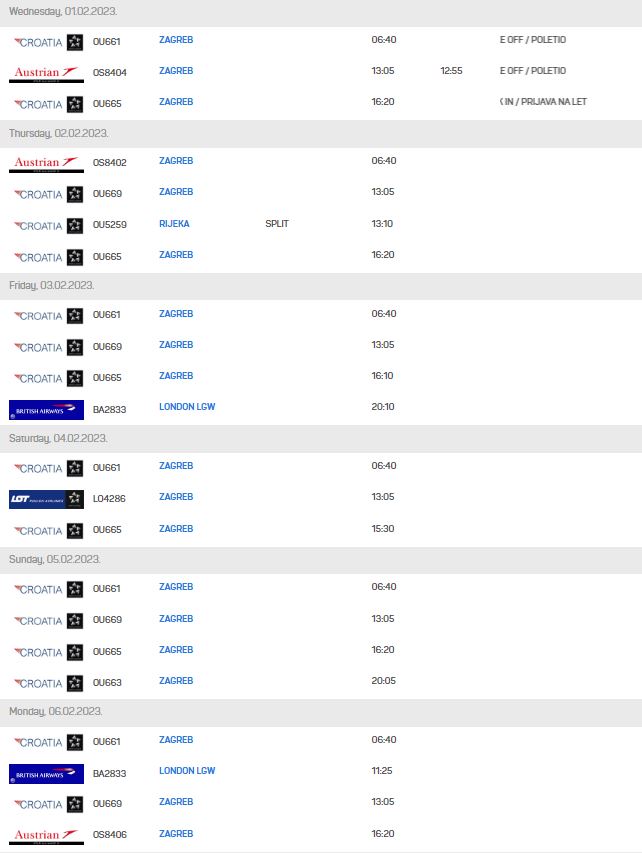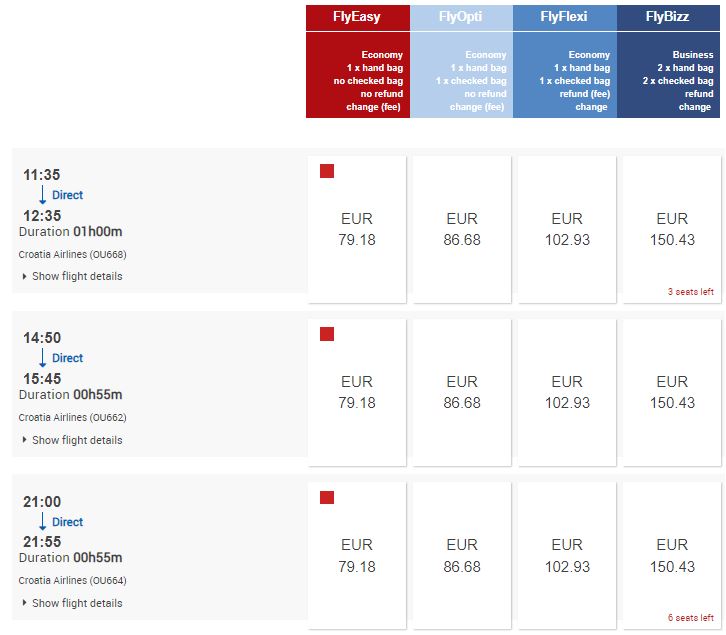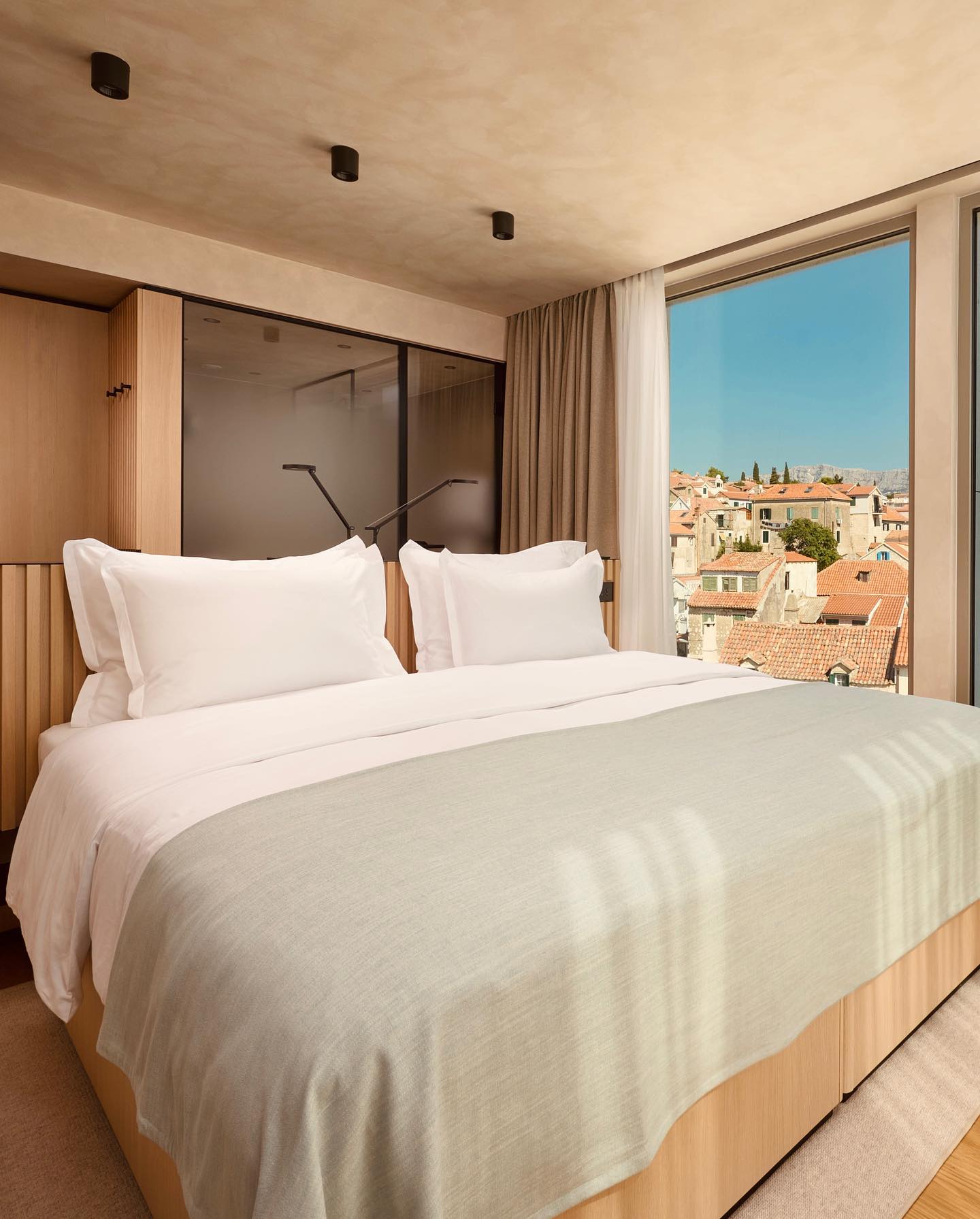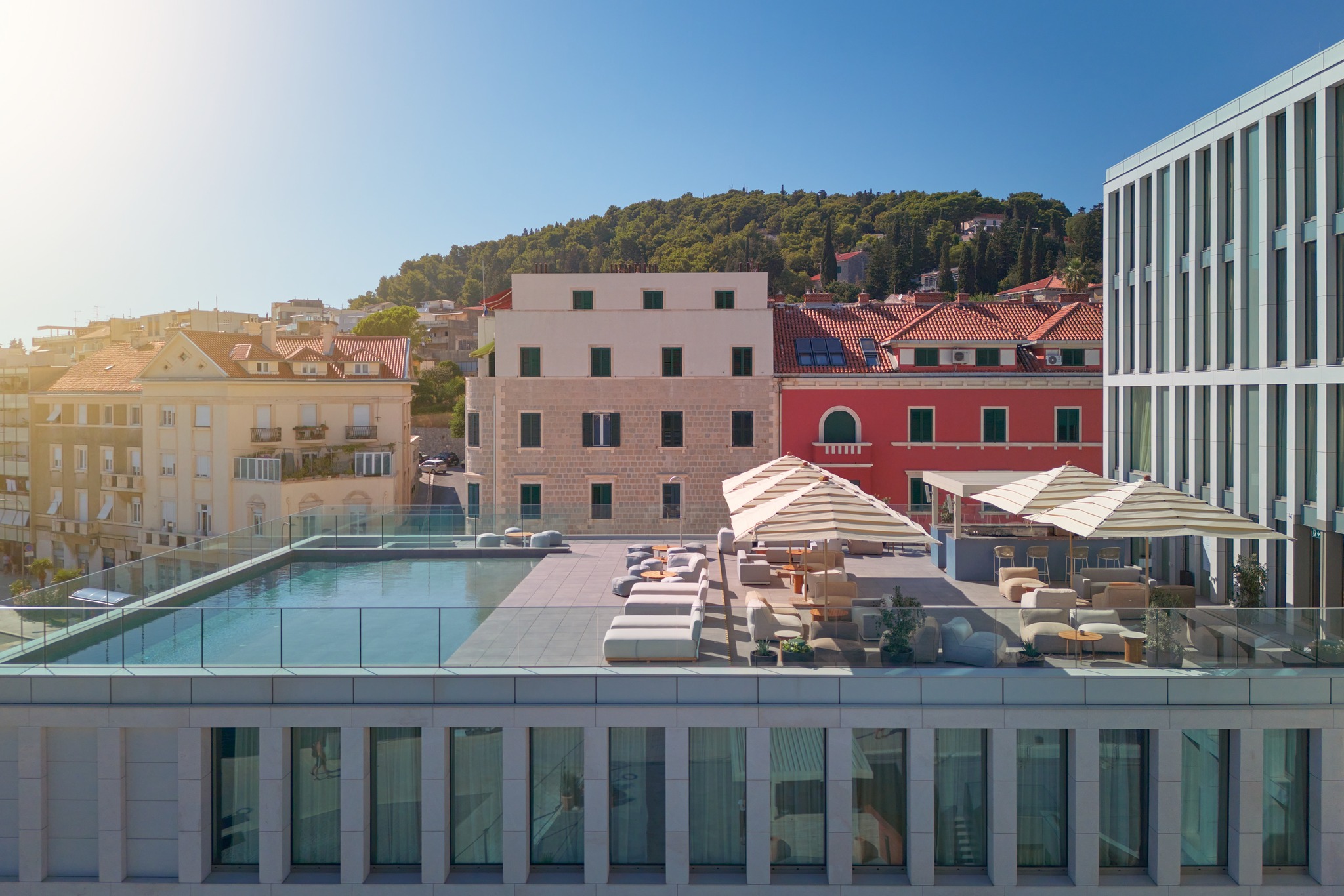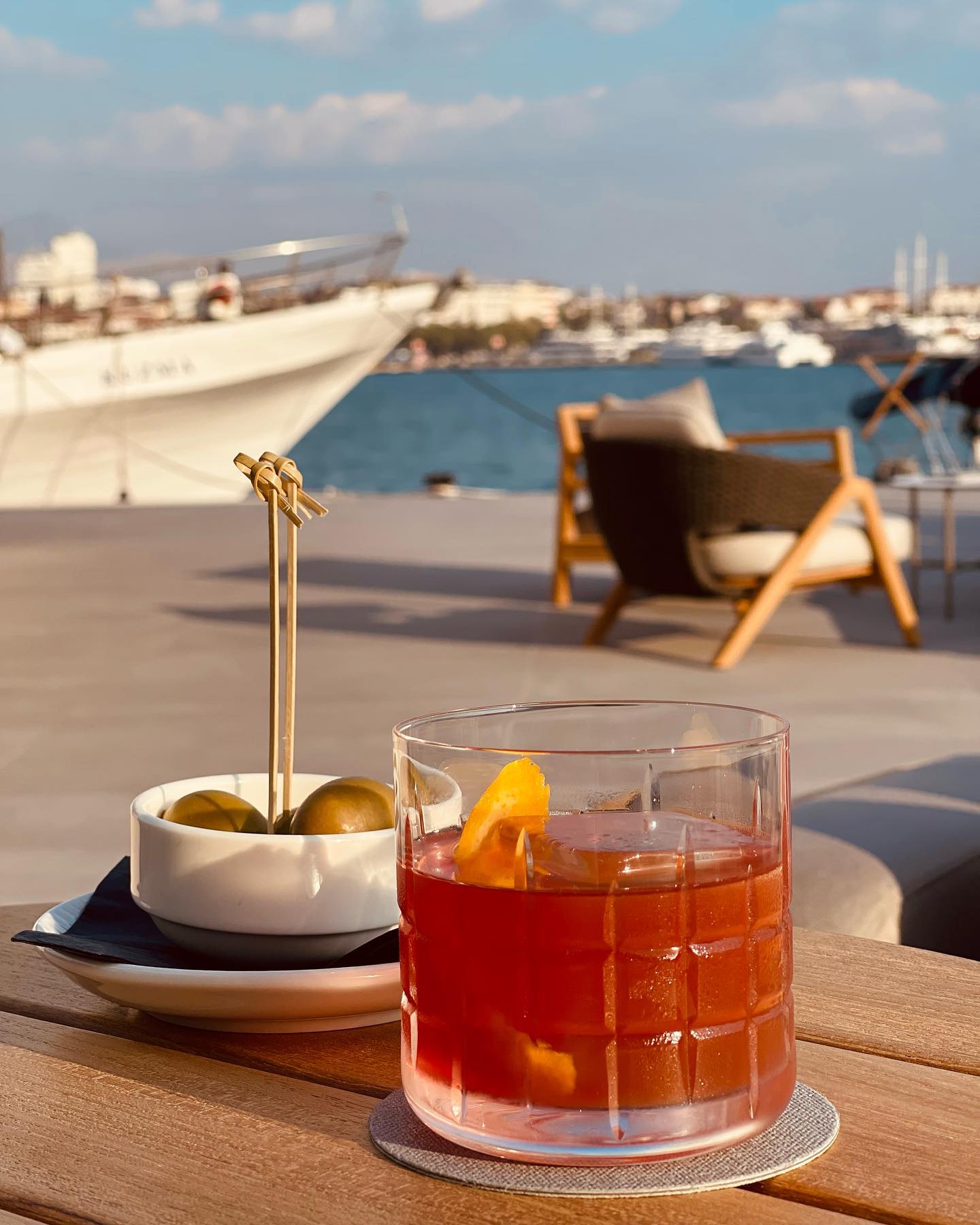10 Things Croatia Does Better Than Anywhere Else
February 15, 2023 - It is a small country which consistently overachieves in many different ways. 10 things Croatia does better than anywhere else.
Croatia.
A tiny country of less than 4 million people.
But a country which punches above its weight on the global stage on SO many levels.
Having lived here for 20 years, I am constantly astounded about how much this small country has achieved in so many areas of life. Here are 10 things that - at least in my opinion - Croatia does better than any other country in the world.
Do you agree? Are there any other things? Answers in the comments below the video, please.
You can read the original article, 10 Things Croatia Does Better Than Anywhere Else on Total Croatia here.
****
What is it like to live in Croatia? An expat for 20 years, you can follow my series, 20 Ways Croatia Changed Me in 20 Years, starting at the beginning - Business and Dalmatia.
Follow Paul Bradbury on LinkedIn.
Subscribe to the Paul Bradbury Croatia & Balkan Expert YouTube channel.
Croatia, a Survival Kit for Foreigners is now available on Amazon in paperback and on Kindle.

New Split Rules on Public Drinking, Dress Code Reach UK Media
February 4, 2023 - A new year and a new approach to improving tourism in Split, and the UK media is spreading the message, as new Split rules for dress and public drinking take effect.
Back in 2015, some drunken Australian tourists were arrested for climbing onto the roof of Hvar Cathedral, causing some 5.000 kuna of damage. They were very remorseful when they sobered up, with one of them agreeing to an anonymous interview with me, which you can read here.
And what is the reputation of Hvar as a destination among Australians?
Priority number one it is a party place. The heritage and buildings like the cathedral are lost in the party culture.
He went on to say after the interview that he would never drink like that at home, but it seemed to be ok to do so in Croatia. There didn't seem to be any rules. If he had been aware of rules, he would not have broken them.
The balance between party and excess has been a constant topic in the media in Croatian tourism over the last few years, with several destinations introducing fines for public drinking and improper dress in cultural centres.
The Dalmatian capital of Split was in the news for all the wrong reasons last summer, with a stream of stories of public drinking, urination and fornication in the UNESCO World Heritage Site, Diocletian's Palace.
It is a subject that TCN covered in some depth, with various interviews on the subject with experts and stakeholders.
These included:
Is Split Tourism 'Strategy' Killing the Goose with the Golden Eggs?
ULTRA Europe Festival's Joe Basic Talks Split Tourism Development.
Luxury Hospitality Expert Zoran Pejovic on Split Tourism Development
Mayor Ivica Puljak promised to act, and it seems that he has. A new bylaw has come into effect, which - among many other things - addresses some of the issues. Public drinking will now be fined to the tune of 150 euro, and walking around historic places topless or in swimwear will no longer be tolerated. An additional benefit of the new law is that these rules will be enforced by patrolling wardens.
Early days, but it seems that that message is already getting out, with the London Metro among others to report the news. A little like the Australian on the Hvar cathedral roof, hopefully a little education and PR for the season will set expectations of behavior.
****
What is it like to live in Croatia? An expat for 20 years, you can follow my series, 20 Ways Croatia Changed Me in 20 Years, starting at the beginning - Business and Dalmatia.
Follow Paul Bradbury on LinkedIn.
Subscribe to the Paul Bradbury Croatia & Balkan Expert YouTube channel.
Croatia, a Survival Kit for Foreigners is now available on Amazon in paperback and on Kindle.

Solving Dubrovnik Winter Connectivity: Flights to Belgrade
February 1, 2023 - Why year-round flights to Belgrade could solve Dubrovnik's huge connectivity problem.
The most important event in the Dubrovnik calendar takes part this year, and - don't tell anyone - this is the very best time of year to visit the Pearl of the Adriatic. The Feast of St Blaise, the much-beloved patron saint of Dubrovnik, is an extraordinary event when the UNESCO World Heritage Site, stripped back to its bare stone with most cafes and restaurants closed, comes to life and is packed once more. But not with tourists, but with locals, emerging from the winter hibernation to celebrate this most important of days. If you have never been, I rate it as one of the top 10 experiences of my 20 years in Croatia - you can read more in Dubrovnik Full of Life as St Blaise Celebrated in Style.
Want to come and enjoy the festivities, or chill in Dubrovnik in the off-season? Good luck, unless you live in Zagreb.
After a week working in Montenegro last week, I got to see the realities of tourism and connectivity in January.
It was a little sobering when I saw the Dubrovnik timetable, a European tourism champion and iconic city which could - and should - be a 12-month destination.
Above is the timetable for the next few days, including those magical St. Blaise festivities. Apart from one flight to London, Zagreb is petty much the only choice.
And even those flights to Zagreb are crazy expensive - despite the fact that they are subsidised with the PSO (Public Service Obligation) scheme.
Here are your one-way options from Dubrovnik to Zagreb a week from now, for example.
I have spent the last week on Lustica, the lovely and almost totally unspoiled peninsula south of Tivat in Montenegro. I flew in and out of Dubrovnik, and I was struck by how poorly serviced Dubrovnik is in the winter, and how the rise of Tivat from nothing has made it arguably a more interesting destination in winter - certainly livelier - than the Pearl of the Adriatic itself. Here is what I wrote:
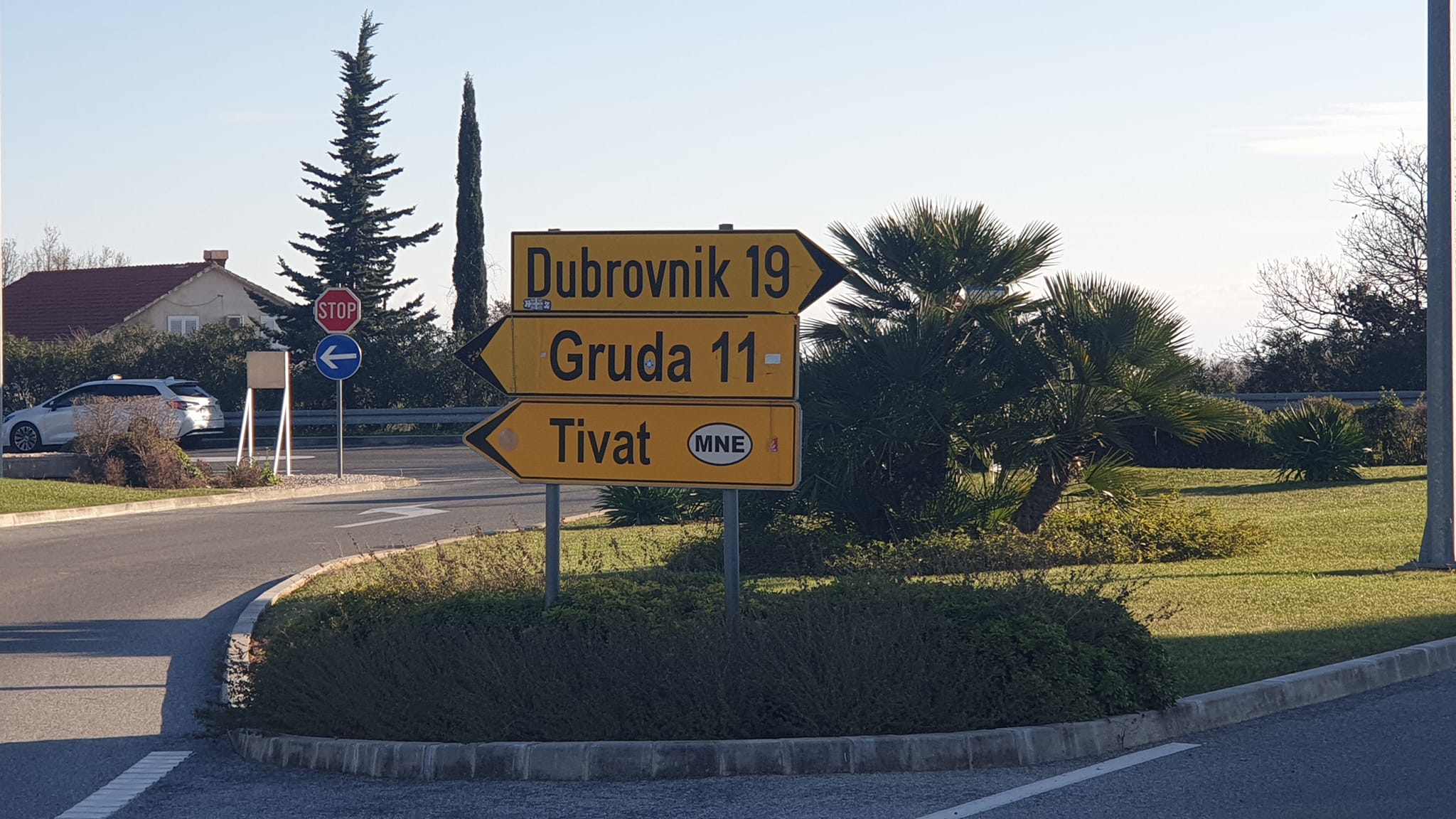
Croatian tourism tragedies in road signs and airport departures. 25 years ago, Tivat was a coastal backwater on the Montenegrin coast. Today, even though it is 3 times smaller than a nearer town to Dubrovnik (Herceg Novi), it has its very own sign as you leave Dubrovnik Airport. Porto Montenegro was supposed to have been built in Croatia, but someone got greedy and Tivat became its home. Today, there are 3 luxury resorts with investment totalling 2.5 billion euro in the Boka region of Montenegro, with many other large developments. By contrast, the largest hotel investment on the Croatian coast in today's money is Haludovo on Krk, a joint venture between Tito and Penthouse in 1971 (and now a ruin for over 30 years) at a paltry 250 million. Not only is the luxury tourism going across the southern border, but so are the locals for entertainment in winter. And flights. Tivat Airport connects to the world 12 months a year, while Dubrovnik is serviced by almost exclusively domestic routes this winter (see timetable in photo). On the positive side in the Kingdom of Accidental Tourism, the sun is shining, and soon the tourists will just come.

And the prices aren't bad compared to those singles with Croatia Airlines (flights February 8-13 - a return not single):
I asked legendary tourism consultant, Mario Seric, for his opinion. The first sentence shows the benefits of being connected to Belgrade, as well as Zagreb, whose connectivity pales by comparison.
Air Serbia will be offering direct flights to 93 cities /destinations worldwide, of which 62 are direct, scheduled, and year-round, 16 direct scheduled seasonal, and 15 direct charter seasonal!
This is impressive compared to the poor connections being offered by Croatia Airlines from Zagreb with direct flights to only 21 destinations (16 year-round and 5 seasonal).
So these connections with Belgrade can also be great to access other destinations as well, especially those that are far away because Belgrade has direct flights to New York, and as of this year also to Chicago and Tianjin...
Air Serbia is currently also considering the introduction of direct flights to Toronto, Miami, Bangkok, and Beijing.
And the good thing in this is that all these flights can be operated by smaller airlines that do not consume a lot of fuel. Turboprop airlines are perfect for intraregional connectivity, and you have a lot of great examples in Europe for this.
Thanks, Mario. And to connect all that network to one of Europe's top destinations, so that tourists could enjoy it out of season, as well as allowing locals to travel with ease, would it really be so hard to connect Belgrade to Dubrovnik 12 months a year? After all, if it is clearly working for tiny Tivat next door, surely it would work for a tourism giant like Dubrovnik. Worth the small investment to try?
Of course, I can understand that there might be some objections in certain quarters given recent history of the connection between Belgrade and Dubrovnik, but the Croatian tourism chiefs decided to move on from the recent past in 2011 by being the main tourism sponsor at the regionally significant Belgrade Tourism Fair back in 2011.
Dubrovnik to the world, 12 months a year. It could - and should - be closer and more realisable than one might think.
****
What is it like to live in Croatia? An expat for 20 years, you can follow my series, 20 Ways Croatia Changed Me in 20 Years, starting at the beginning - Business and Dalmatia.
Follow Paul Bradbury on LinkedIn.
Subscribe to the Paul Bradbury Croatia & Balkan Expert YouTube channel.
Croatia, a Survival Kit for Foreigners is now available on Amazon in paperback and on Kindle.

Hotel Ambasador, Split's New 5-Star Diamond: Meet GM Stipe Medic
January 30, 2023 - I have stayed in many hotels on the Croatian coast over the years, but none with a view quite like the new 5-star Hotel Ambasador in Split. Learn more about that and this fabulous new addition to Croatian tourism by meeting Hotel Ambasador General Manager, Stipe Medic.
Split has a 5-star hotel in a 7-star location, with simply the best hotel view I think I have seen in my life. Introduce Hotel Ambasador for us.
Split had been waiting for something like Hotel Ambasador for a long time, and it is certainly a hotel that a destination like Split deserves. You said it yourself – Ambasador's God-given location with a perfect view over the Split harbor and old town was the starting point for management to think about and develop the hotel's features and amenities. They had to be as extraordinary, strong, and beautiful as the location itself. In short, Ambasador is a 5* hotel that opened at the tail-end of summer 2022. The hotel has 101 rooms and suites, each with an open view to the harbor and/or Split’s old town, with a direct path to the promenade connecting Diocletian’s Palace and the famous Riva on one side, and the port, the most beautiful beaches, and Marjan forest on the other.

The design is very distinctive. Tell us more.
Architects Nora Roje, Neno Kezić, and Emil Šverko are the authors of the project. The idea behind it was a contemporary reinterpretation of the original hotel building that was the center of Split's social life since 1937. Both the interior and exterior were designed to be in line with Split and the Mediterranean’s notoriously relaxed lifestyle, summed up by one word – 'pomalo'. We believe that we managed to deliver this with equal parts of luxury, subtly refined design, and above all, inviting and cozy architecture. The interior decor was conceived by studio Arhiv, with special attention to the highest-grade natural materials and their key accents. It tells the story of Ambasador’s tradition and exclusivity, which has been there from the beginning. Several objects represent a direct dedication to Croatian architectural heritage, but the hotel's most distinctive feature is its orientation towards the outside because Ambasador's greatest value lies, literally, in its surroundings.
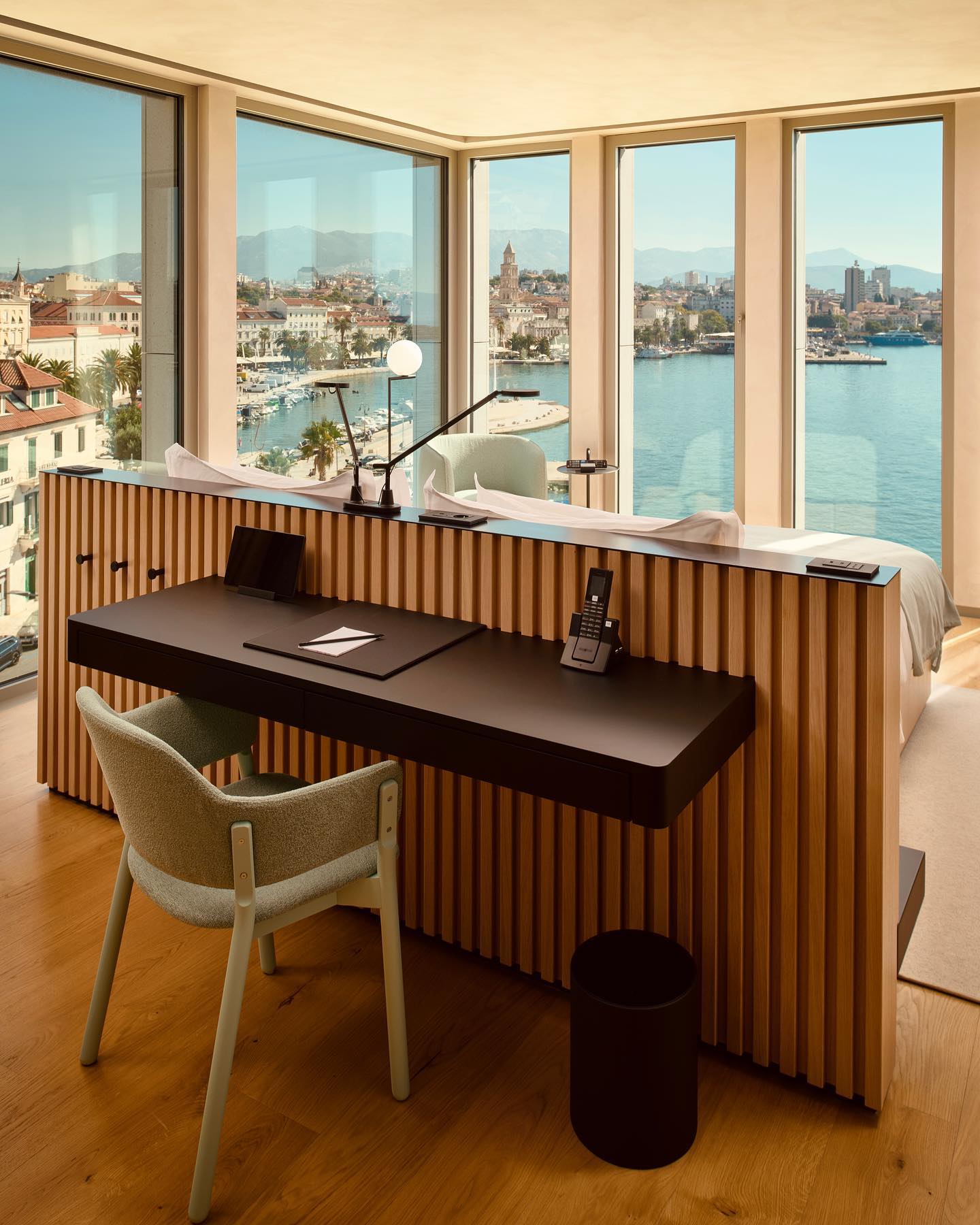
One thing that is immediately obvious is the connection between a luxury hotel and the city. Giant photos of life in Split in the 1960s make a real impression on arrival in reception. Tell us more about that concept.
Split's heritage is a crucial part of the hotel's identity. We wanted to represent it in the common areas in the best way possible. We wanted our guests to emerge in the laid-back Split vibe from the moment they enter the reception. We thus contacted Feđa Klarić, a great photographer and Split photo chronicler. Our cooperation resulted in what you can see now - his works mostly, and the authors he chose. Famous pieces from his vast collection of Split motifs throughout history are a sort of permanent exhibition in our hotel. We take much pride in that!
The location is superb for several reasons, not only the views and the proximity of the marina, but also due to its distance from Diocletian's Palace and the riva - close enough to walk to but far enough to avoid the noise. How important is the location do you think?
Ambasador's location on the coast, just footsteps away from the hustle and bustle but outside the epicenter of nightlife, is ideal not only because of the breathtaking views and scenery. Guests can exit the hotel and, within minutes, be in a beautiful pine forest, on the best beaches, or in the heart of the city. You can even feel the buzz of the nearby islands. I'd say it is our Croisette.
You are a local man. What impact will such a luxury hotel have on life and tourism in Split?
Hopefully a big one! I think we all want more upscale locations and services in Split. The fact is, a prime destination like Split deserves and surely needs more high-class hotels. Ambasador is here to fill that need. The profile of guests visiting largely defines the offer of any tourist location, so by bringing in travelers looking for that premium experience, Ambasador will contribute to the diversity of what Split has to offer.
You opened at the end of the season. How have things gone so far, and what lessons have been learned?
We are more than satisfied with the first results. The most important thing is the feedback from our guests, and their response is great! We decided to soft open Ambasador to have enough time and resources to dedicate the whole team to the needs of our guests. And what have we learned? Those challenges, which are an essential part of beginning in any business, make us stronger and push us forward. It goes without saying that we should always strive for more and be better at our work.
How are bookings for next season, your first full year, and what kind of season are you expecting?
Bookings are going well, and the announcements for next year give us reason to be happy and optimistic. We expect our first full season to be exceptional. All the interest shown in Ambasador after opening is further proof that this is what Split was missing.
Tell us a little about what guests can expect from a stay at Ambasador.
We are delivering the highest standard of luxury service but with a relaxed, casual feeling that makes Split famous. We encourage our guests to take their time and truly feel the life of this vibrant and welcoming city. And what can we offer? Rooms with unforgettable views, furnished and decorated in accordance with the highest standards, our fine dining restaurant Méditerranée, the lively Bar Split, outdoor pool, top-notch beauty and spa services at Hacelia Spa, which spans over 500 square meters, a rooftop bar with even more magnificent views over Split's archipelago, a multipurpose conference room, and a highly personalized approach to every guest's needs. In short – our guests can expect a superior Mediterranean experience.
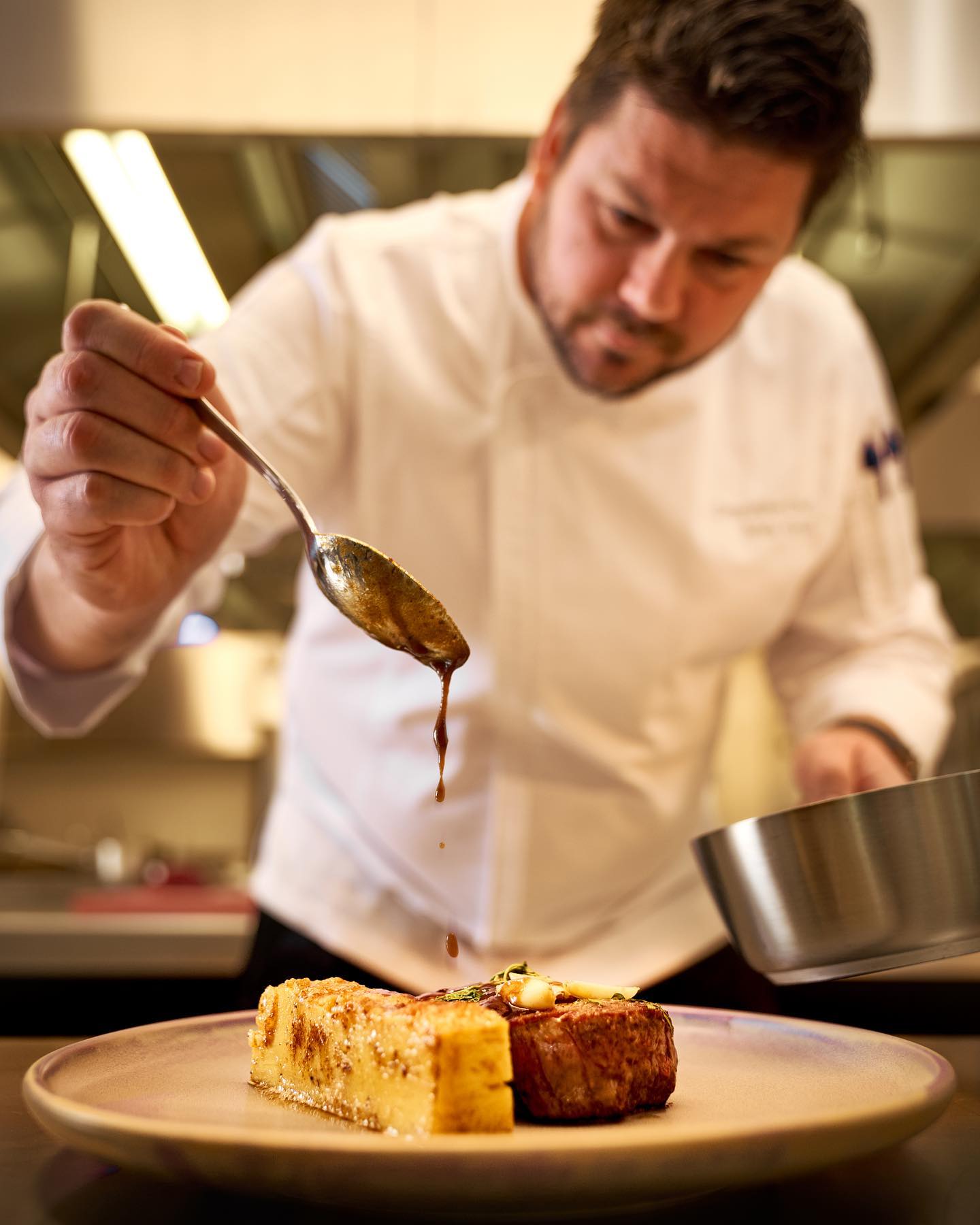
How accessible will the hotel and its services be for locals and non-residents.
We want Ambasador to live with, and not next to, Split's residents. The entire philosophy is to be an integral part of the city. Our terraces, bars, and restaurants are part of the promenade, and our events are oriented not only toward guests visiting Split but also toward people who live here because they make Split what it is. We want to show that distinctive vibe to our guests because we want them to develop a sort of crush on Split, to feel they want to come back for more. And that is not a hard task!
And finally, as a local man, your 3 favourite things about Split.
I am from Brela, but I am also in love with Split. First and foremost, because of our football team, Hajduk Split, which has given me so much excitement (and so many headaches) in life. My second favorite thing about Split is sitting on Ambasador’s terrace and enjoying all the beauty that was given to this city. I also love Split’s mentality and humor, and at the same time, the fast-paced, slightly nervous, but really nurturing and laid-back ‘pomalo’ way of life. Split is easy to love, and I think everybody can agree on that.
To learn more about the magic of Split's new tourism star, check out the official Hotel Ambasador website.
E-Tourism: New Set of Digital Public Services for Croatian Tourism Launched
January the 26th, 2023 - Meet E-tourism, a brand new set of digital public services for the ever-important field of Croatian tourism has been launched in time for this summer season.
As Poslovni Dnevnik writes, E-tourism is a brand new set of digital public services for the field of Croatian tourism which has been made available from today via the e-Citizens (e-Gradjani) system. The new E-tourism service has otherwise been created as part of the three-year project involving Croatian digital tourism or e-tourism, the final activities of which were presented on Wednesday this week by the Croatian Ministry of Tourism and Sport (MINTS).
Presenting the brand new E-tourism project and its aims for the tourism sector at the press conference, its leader and director of the Directorate for Strategic Planning, Digitalisation and EU Funds, Natalija Havidic, explained that the project has actually been being implemented since back at the beginning of 2018, and will finally be completed at the beginning of February this year.
The goal of the project and all the resulting electronic services is to improve the efficiency of public services and communication between people and tourist entities within public administration.
Three new e-services for tourism were created as part of that project - TuStart, TuRiznica and TuRegistar, which are under the jurisdiction of MINTS. Two more were previously upgraded in the process - eVisitor as a system for the registration and de-registration of tourists and the portal Croatia.hr, which presents the entire Croatian tourist offer and various types of information, both of which are under the jurisdiction of the Croatian National Tourist Board (HTZ/CNTB).
The TuStart service, according to Havidic, is intended for the online start-up and registration or change of tourist activities, TuRegistar is a tourist central register that will include all enterprises and individuals engaged in Croatian tourism, including the categorisation of facilities and more, and TuRiznica is a system in which one can see and submit requests for the allocation of all grants in tourism transparently online.
"The importance of this E-tourism project lies in the fact that now the paper-based issuing of various permits, solutions and so on can all be done online, and that all these solutions are digitally mapped. The accuracy of the data entered, for example, in the TuRegistar system should be verified by MINTS and the competent county, and then it will all be visible in that system," concluded Havidic.
For more, make sure to check out our dedicated news section.
Croatia Marks THIRTY Years of Official Golf Strategy Failure
January 22, 2023 - After an astonishing 30 years of official golf strategy in Croatia, is it time for someone to be accountable?
This is not an article about golf.
I also hereby state that I have no real opinion or expertise on the merits of golf tourism, and so I offer no opinion on whether or not golf tourism is a good thing or not.
This is an article which uses the official golf strategy in Croatia to highlight the seeming incompetence and unaccountability of those in official positions in charge of charting (and delivering) Croatia's tourism direction.
While looking into the research for this article, I came across two rather unlikely anniversaries for golf in Croatia.
Did you know that Croatia is celebrating 100 years of golf tourism in 2023? And that its golfing heritage have some claiming that it is home to the oldest golf resort (please note - resort, not golf course) in the world. From the Brijuni National Park official website:
The construction of the golf course on Brijuni was finished in late 1922, and the first tournament was held on 21 March 1923, a mention of which was published in the Pula daily newspaper at the time. The course was claimed to be one of the biggest in Europe. More recent information suggests that the Brijuni course might have been the first golf resort in the world. The course certainly stood out, not only because of its climate and position (Mediterranean destination in “Mitteleuropa”), but also because of its good reputation. Namely, although European championships were never played here, if you were to read the newspapers and journals of the time, you would have got the sense that the course was exceptionally well-known and recognised, both among golf champions and the upper classes. In addition to world-class golfers, the course was frequented by members of the European aristocracy, the most renowned industrialists and artists. Up to 50 tournaments a year would take place on the course of Brijuni, and the trophies for the best players were finally presented at the New Year's Eve ball and gala dinner.
The second anniversary Croatian golf is celebrating is even more unlikely given the state of play today (unless you have an insider appreciation of the genius of the Kings of Accidental Tourism): Croatia has now had golf tourism as a key component of its official tourism strategy for THIRTY years, since it first appeared in 1993, in the middle of the Homeland War (see the official document in Narodne Novine):
The new construction of content and capacities in tourism should be focused on the construction of quality additions to the existing offer (golf courses, fitness, etc.). Likewise. it is necessary, when investing (in new or existing facilities), to especially stimulate the construction of hotels of only higher and higher categories (four and five stars), and to stimulate them with tax and communal policy.
In the development and investment sphere, at the level of full state support, several so-called "project shock". These are, above all, projects such as Brijuni, the city of Dubrovnik (a new marina and residential center in the old city center), Tustica near Zadar (a large complex of nautical, golf and exclusive accommodation), the Goli otok project. Opatija, and, possibly, the project of revitalization and bringing the castles of Hrvatski Zagorje into tourist exploitation. In addition, in almost every large tourist company (combination) until yesterday, it is necessary to define and start a basic project that affects any restructuring.
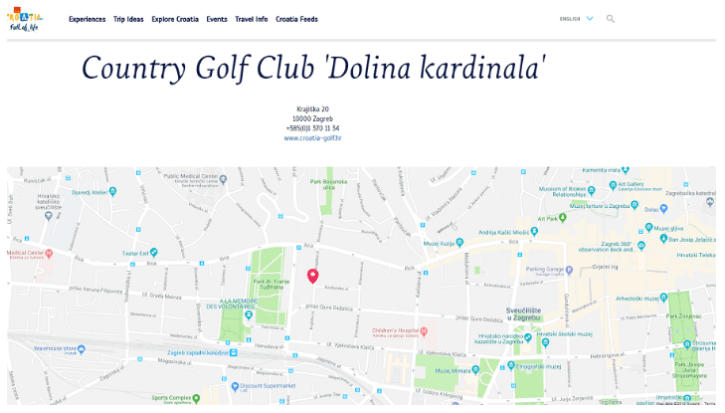
(Croatia.hr screenshot)
Croatia currently has three 18-hole golf courses, some 30 years later. Brijuni, which opened in 1922, Zapresic near Zagreb (2004), and Golf Adriatic near Savudrija near the Slovenian border, which opened in 2009. The Croatian National Tourist Board tried to have us believe there was an 18-hole golf course called Dolina Kardinala in the middle of Central Zagreb a few years ago, before they removed it when I pointed this out (read more in Tourism Quiz of the Summer: How Many Golf Courses Will Croatia Have Next Week?).
They were right to remove it. Dolina Kardinala closed in 2012, and this is how it looked from a drone tour a few years ago.
So in 2013, on the 20th anniversary of Croatia's official golf tourism strategy which had yielded just two courses in that time, in addition to the one which opened 90 years previously, the 7-years tourism strategic plan was presented. One could argue that 2 courses in 20 years was not exactly a roaring success, but it did not seem to deter the Kings of Accidental Tourism, who once more put golf at the heart of their long-term strategy.
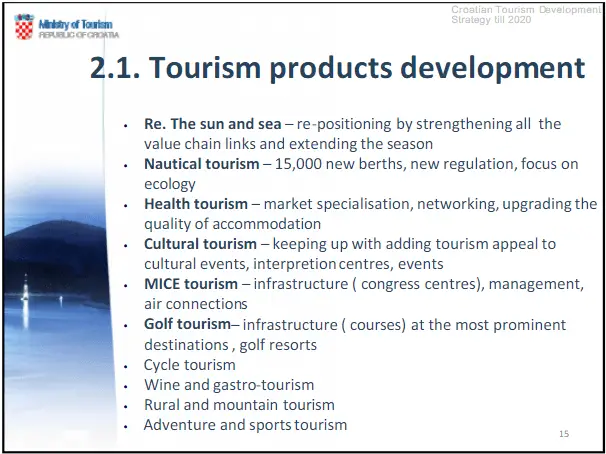
Not only a healthy interest in golf, but no less than 30 golf courses were to be constructed over the next 7 years, by 2020. Seriously impressive stuff! The strategy document (the link used to work for me, now I get a message of Forbidden 403...):
The 2020 tourism development strategy foresees the construction of 30 new high-quality golf courses, roughly at the following locations: 14 in the northern Adriatic, 8 in the southern Adriatic, and 8 in continental Croatia.
By 2020, the end of the 7-year plan, not a single course had been started. Nobody seemed to mind or make a comment, the 7-year plan had come to an end.
Indeed, such is the relaxed pace of life in the Kingdom of Accidental Tourism that for the next two years, there wasn't an official strategy document at all, as the next 7-year plan was being worked on. I think I am correct in saying it still has not been officially released some three years later.
So Croatian tourism has been rudderless without an official 7-year plan for almost three years. Has anyone even noticed?
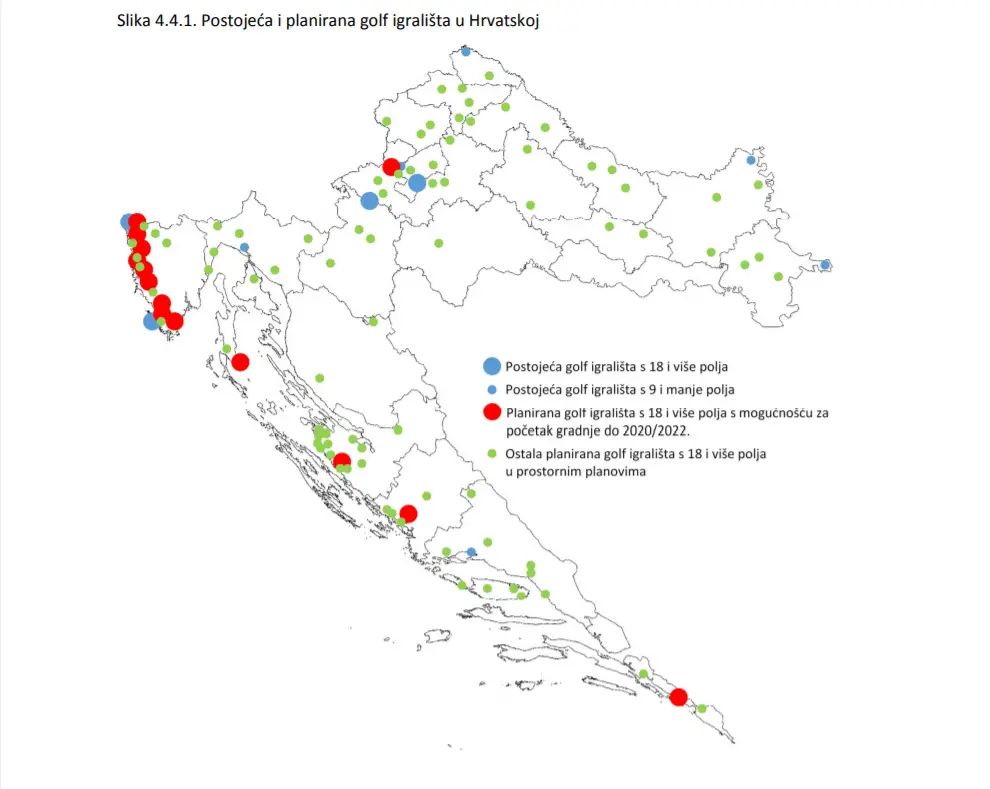 Back to the golf. The plans looked very pretty indeed.
Back to the golf. The plans looked very pretty indeed.
The difference between Croatia and tiny Slovenia next door is that the Slovenian golf courses were actually real - here is a guide to the 13 Slovenian golf courses compiled by the Total Slovenia News team a few years ago.
Having marvelled at the genius of the Kingdom's methods over the years, one thing I have learned is that if the Kings are doing nothing, they sure know how to look busy and tell everyone how busy they are, as we explored a few years ago in No Courses Started in 10 Years, But THREE Croatian Golf Tourism Conferences in 2019.
That sure is busy.
The other thing to do to look busy if nothing is happening is to order an expensive report to show how busy you are. And so the 2017 Golf Action Plan was born.

In the redacted edition of the report, there is mention of two quite special projects - Porto Mariccio in Istria, and Srdj above Dubrovnik. The latter is currently the subject of a US$500 million lawsuit against the Republic of Croatia, from memory under arbitration in Washington in a suit filed by the Israeli investor, and Porto Mariccio is my favourite Croatian golfing story, for it involves one of the greatest names in golf, the late Jack Niklaus. The Golden Bear arrived with great fanfare in 2016 and was met at the airport by the then Prime Minister Ivo Sanadar (before he went to prison). Nicklaus announced a 200 million euro golf resort called Porto Mariccio in Istria. With the Prime Minister's very public backing, that had to be a cert, surely?
I contacted the Jack Nicklaus Course Design company in 2018, some 12 years later, while researching Whatever Happened to Jack Nicklaus' Croatian Golf Course, Approved by PM Sanader? asking about their involvement, to get this response:
Unfortunately we have not had any communication with the Porto Mariccio project in a number of years and are unable to provide any update for you.
So here we are in 2023, celebrating 100 years of golf tourism in Croatia, and analysing 30 years of official golf tourism strategy. So where are we? Director of the Croatian National Tourist Board Kristjan Stanicic took time out from issuing SLAPP lawsuits against fat bloggers and gave a quite extraordinary interview to Novi List recently. You can read my take on his interview in Croatia National Tourist Board Finally Adopts Some of My Ideas. On golf, he had this to say:
One of those contents that we may already be a little bored with, but it is certainly golf. In no way to break the deadlock, we are aware that, for example, the south of Portugal and Spain are working on golf during the winter season. Climatically, we are very similar.
We are similar, but with the difference that there are very mild winters, which means that you can play golf all year round. We can use it in some southern destinations, islands, even Istria. But nothing happens overnight. There is a lot of talk about golf, it has been worked on for many years.
The esteemed director might be a little bored with golf, but I think the taxpayer would rather see some results, or at least a focus on some other niche that will have some results.
And perhaps a little accountability for the non-delivery of 30 out of the 30 golf courses to be delievered by 2020. Indeed, what are the results of these 30 years of official golf tourism strategy?
Two golf courses and a lawsuit for half a billion dollars against. Good job!
But the final word perhaps should go to the official Croatian National Tourist Board website, which is celebrating 100 years of golf tourism. The 18-hole course from central Zagreb has gone, as have the other courses in Croatia. Here is the relevant information about 100 years of golf tourism and 30 years of official golf tourism strategy in the Kingdom of Accidental Tourism:
Your greatest hits
Despite only having a few courses with 18 holes at the moment, besides the one in Brijuni National Park and some private courses, Croatia aims to become a significant golf destination. Just relax during a game walking through fields surrounded by its idyllic countryside and enjoy its gentle climate to find out why.
Soon you’ll discover there is much more than meets the eye, they say that most company decisions are made on golf fields but the only decisions you will have to make are which vineyards to visit, where to go shopping, will you go sailing… or just keep playing one more hole!
As the Croatian National Tourist Board was keen to point out in their SLAPP lawsuits against me, I am not a tourism expert (nor did I claim to be). I don't know a lot about golf either, but one thing I do know is that they are called 'golf courses' not 'golf fields'. Perhaps we can organise another golf conference to discuss.
Read more - 10 Things I Learned from my SLAPP Lawsuits in Croatia.
Golf in Zagreb? Bring Your Own Clubs, Kilts, Whisky and Bagpipes.
****
What is it like to live in Croatia? An expat for 20 years, you can follow my series, 20 Ways Croatia Changed Me in 20 Years, starting at the beginning - Business and Dalmatia.
Follow Paul Bradbury on LinkedIn.
Subscribe to the Paul Bradbury Croatia & Balkan Expert YouTube channel.
Croatia, a Survival Kit for Foreigners is now available on Amazon in paperback and on Kindle.

Croatian Hunting Tourism Making Post-Pandemic Return, With Higher Costs
January the 16th, 2023 - Croatian hunting tourism, while controversial for a great many and with good reason, is making a post-pandemic return much like other forms of tourism have, but like just about everything else - the costs are higher than they were before.
As Poslovni Dnevnik writes, Croatian hunting tourism is slowly recovering after the global coronavirus pandemic. Traditional guests for this form of tourism, primarily the Italians, have returned to the Istrian forests and other hunting grounds and are now coming to hunt snipe, a form of bird. They aren't yet arriving in particularly large numbers, but in this winter season, when tourism is scarce, every single euro earned is a good thing, reports HRT.
Valerio and Moreno know the terrain around Sisan in Istria well, and they have been coming here to hunt for more than 20 years now.
"I come here to do what I love doing the most - snipe hunting. There are snipe here, the hunting grounds are good, and it's also suitable for working with younger dogs,'' emphasised Valerio Piazol, a keen hunter from Italy.
In order to be allowed to hunt in this country, foreigners must pay a registration fee to the local hunting society, hire a local hunting companion, but first of all buy a pass from the Croatian Hunting Association. With the beginning of this hunting year, there are changes when it comes to costs, just as there is with everything else.
"The price of the annual hunting license has increased from 66 to 300 euros. That's an increase of 350%. I think it's excessive," said Moreno Vaciloto, another hunter from Italy. In addition to the increase in the price of hunting licenses, the arrival of the hunters themselves is also being affected by this unusually mild winter.
"For example, foreigners come here to hunt snipe. A winter like this has a very negative effect on the migration of birds, particularly snipe, because they aren't like swallows that migrate for six months and then come back to nest there. Snipe simply move along when there's no food," exolained Augusto Dobrani, a hunter in Sisan.
While the Croatian hunting tourism picture is indeed gradually recovering in the post-pandemic, inflation-dominated world, there is less game, and as such there are less hunters. Last year, there were about 1,200 foreign hunters hunting on the Istrian Peninsula and before the pandemic, there were very many more.
"The fact is that more than 1,800 hunting passes were issued annually through the Hunting Association of Istria County, out of a total of 7,8,9 thousand hunting passes that were issued on the entire territory of the Republic of Croatia," said Gracijano Prekalj, president of the Hunting Association of Istria County.
Aside from paying for their ability to hunt on Croatian territory, those hunters who come fill up accommodation facilities and visit local restaurants.
"They're good, they have money and they are good consumers. They eat a little game, but they like to eat good fish,'' stated Dusan Cernjul, an Istrian restaurant owner.
Income from Croatian hunting tourism is not negligible despite the current difficulties it is facing, and it is estimated that foreign hunters in Istria alone spend around 2 million euros annually.
For more, make sure to check out our dedicated news section.
Security Consulting for Tourism & Event Industry: Meet Goran Košćak of Sector2
January 17, 2023 - The tourism event industry is a major part of the Croatian economy, but who is taking pat of large event security. Meet Goran Košćak of Sector2.
The tourism industry has many facets, and there are many aspects that contribute to its success which rarely make the headlines. With an increasingly number of festivals and larger events in Croatia, the issue of event security is more and more relevant. I recently came across an enterprising Varazdin entrepreneur who has launched a new niche business within the tourism security industry.
The man behind the story is Goran Košćak. He is the founder and executive director of Sector2 d.o.o. from Varaždin, a company providing security consulting and solutions in tourism and event industry. So, Hi Goran and tell us about how and when you got the idea for your company and for this type of business model.
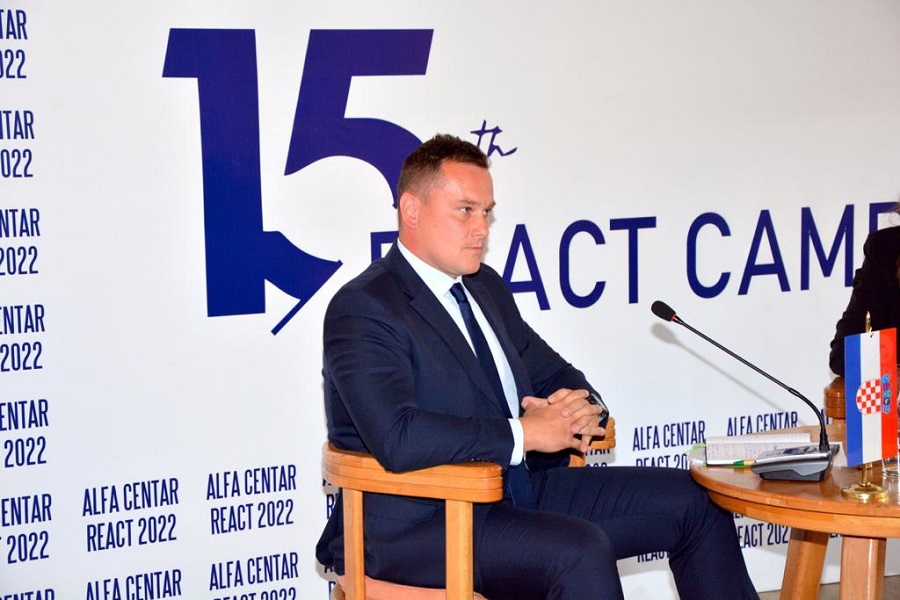
Hi, Paul. One could argue that the correlation between security and tourism is understood and inevitable. Even in its etymology, security, with the core of the term coming from Latin securitas is translated as the absence of worries. Tourism has the absence of worries as the essence of its very concept. Meaning, that the very last thing you want to or need to worry about when enjoying your holiday or attending your festival is your own security.
In analyzing the market of tourism, hotels or camping sites and events, business subjects rely heavily on the government and local public service to provide the expected level of security and do not engage properly in raising the security of their own destinations. For example, how many hotel resorts or camping sites have a corporate or any other security department or an individual responsible for security issues on the site? Agonizingly few, and often issues of security are delegated to maintenance, facility management or human resources departments. Organizers of festivals, conferences, and similar events tend to have security budgets; however, it often comes down to security guards. Security is a much broader concept than that, and physical security is not the only way to address potential threats. Whether it is an organizational adjustment, smart solutions, AI integration, infrastructural design, or sometimes just more security guards, the solutions for every client are individual and unique. Maximizing your security is not a generical assignment.
The idea originated back in 2015 after the terrorist attacks in Tunisia beach resort and museums, where attackers targeted tourists and a total of 60 people were killed. During that time, I was working on matters of national security and was analyzing security policies in Croatia. I began to understand that there are significant differences in public policies (goals and outcomes) in matters of tourism and security on national level, implementation on the local level and operational product in the real sector. In the upcoming years there were multiple reports of kidnappings in Mexico's tourism resorts because of their drug wars. As a result, hotel resorts in those and other countries in the World started investing to build up their security and provide their guests with a level of higher security and reduced risk (closed resorts etc.). Still, I could not find any adequate business model in Croatia, one that would address similar issues. And one must take into consideration that Croatia's economy is one of the most dependent on tourism in the EU (24.8% of GDP according to WTTC data). The idea grew, was developed, and organized over the last couple of years.

As we learned in recent years, threats to your tourist season do not have to come from near proximity to your destination. The global village we all lived in for the last couple of decades is going through fundamental changes with the forming of blocks of countries influencing the flow of goods and people related to tourism. An example is how the Ukraine-Russia conflict influenced the Montenegrin and other tourism seasons. Then again, the effects of the pandemic are still ongoing, the aviation traveling industry is still recovering, the migrant routes are still active, demographic effects on the labor market are as relevant as ever not only in Croatia. Cyber-attacks happen every day, we had a couple of extremist attacks in the EU just in the last couple of years (France, Belgium, Turkey, Austria), potential outcomes of Chinese-Taiwan conflicts on microprocessors shortage can influence the EU’s economy any month now, and there is a foreshadowing of a severe recession in Europe, especially, Germany, the country with the biggest incoming tourist's percentage in Croatia. To name a few. Anybody who works in tourism can testify to how some of these events have influenced or could influence the tourism season in the coming years.
However, there are ways in which one can prepare and organize so that when those changes happen, they do not set your organization back and through the process you build resilience of your organization for the years to come.
Sector2 focuses on the two intertwined sectors (tourism and event industry) in two ways - praxis and theory. Its services include operational and analytical support based on overarching principles of security for tourism resorts/destinations and standalone events/congresses. Also, we offer coaching, educational programs and policy analysis on the correlation between Security and Tourism. It is our strong position that even by investing in the training of the management or staff you can raise the level of security at a particular destination. Our services will contribute to the sustainability of your business, project, or location and offer you a marginal advantage towards your competition.
It all sounds very logical and straightforward. What do you believe sets you apart in the tourism market and what services and type of consulting is your company providing?
What sets Sector2 apart is the fact that there is no other company that focuses on these issues in this field across the region and that the professional experience that it brings is extremely specific. Our past is our biggest asset. Over the past seventeen years, I have personally been fortunate to have jobs that I have enjoyed and that have given me the opportunity to grow, learn and develop. For the first six years I have worked in tourism, dealing with various assignments and handling projects in marketing, PR, event, destination, and project management. Then, for more than a decade afterwards I have been involved with different matters of security, specifically international relations and diplomacy, security policies, intelligence and counterintelligence, national and corporate security, and risk management in the practical, analytical, and theoretical sense. I have a wealth of knowledge, experience, and networking contacts in these areas, which merged and resulted in the forming of the Sector2 company. Sector2 is the professional culmination of my experience, knowledge, skill, and interests.
The range of consultancy Sector2 provides goes from critical architecture and infrastructure, forming of security rings/areas, access control, credentialing, risk assessment, security protocols, crisis communication, security auditing, business intelligence, facilitation of video surveillance, cyber protection, data storage, data recovery, cooperation with local and national security services, standard corporative security, and other services. It also serves as a hub for companies that are well versed and experienced in the specific fields mentioned.
While evaluating the market, it became obvious that business owners in the tourism sector do not contemplate issues of security at all or until it is too late. Allowing Sector2 to evaluate their situation and give recommendations can improve not only their security and the security of their guests but also the quality of their product. Security consulting and recommendation of different solutions can be viewed as a way of risk evasion in insurance sense. Even better, we are developing a model of cooperation with two big insurance companies which would benefit business subjects in tourism. With the reduced risk of your destination or project, and the safer environment, there is no reason your insurance premiums should not be reduced.
Security can function with multiple purposes. Sector2 identifies major security risks and develops a set of agendas for managing them, which facilitate operations, prioritize protecting people and other organizational assets while supporting your vision and goals. We provide a coordinating service, marshaling relevant internal and external resources to provide a holistic response always guided by organizational objectives (Gill, 2022). It is our company goal to make your hotel resort, camping site or event profits and reduce losses. Sector2 individualizes and adapts the security needs of tourism/event organizations to add value to your business, enhance your product, and elevate the guaranties of your set goals.
An advantage we bring to the table is the specific experience. Tourism and event industry have delicate natures and viewing it solely from the security aspect could damage the organizational goals. It is rare for someone to embody that sense in one business model and that is exactly what we take pride in. In the last year alone, among our clients were hotels in Croatia and Austria, and we have worked on the biggest and most attractive festivals in Croatia such as the Ultra Europe Music Festival and Fusion World Music Festival in Split, Balkans Finest Competition on the Željava Air Base, and the Phoenix Project.

How do you evaluate the recent substantial changes in Croatia and how will it influence the tourism season, specifically the entrance in the Schengen- and Euro-zone? If you can focus on possible negative effects on tourism and how would you address them. Just some examples to see how Sector2 operates.
The positive effects on the Croatian tourism could be tremendous, most likely incremental, and I absolutely support both achievements. However, let us talk about the flipside of this euro-coin, risk-wise. There is less security on the border (direction EU) now so local and regional security services are going to have a lot more on their hands, especially during the tourist season. Therefore, I expect that the involvement of business subjects in matters of resolving security issues and raising security awareness on their properties will be expected to rise. For instance, there is a much higher possibility now than before that some persona non grata or illegal substances appear on your destination. Now that there is a border control missing. There are ways to contribute to the safety of your destination. Whether by education of your management and/or staff, better cooperation with the local services on these issues, implementing or adjusting the access control on the site, installing video surveillance with specific software or some other individual solution adequate for your destination or event. Sector2 is here to evaluate and facilitate your requirements and challenges.
The entering of the Eurozone should simplify many aspects of financial wellbeing for tourists in Croatia, especially foreign ones, in comparison to before. Even so, let me focus on the potential security issues tourism resorts and events could encounter. Primarily, one can expect that there will be a significant rise in foreign tourists coming with larger amounts of cash. That logically increases the possibility of counterfeited bills in circulation. If we take into consideration that your resort or event has many registers or micro locations selling items (bars, souvenir shops, leisure activities etc.), we can agree that there is a bigger chance that your organization is going to be affected by it. Also, visibly large cash amounts usually invite thieves or similar individuals. There are solutions for those issues as well. For instance, implementing a cashless system in your resort or event. That way all your financial intake has a bigger control. The Tax services are going to love it because it is easier to control, and inspections will go faster. There will be no money missing in the register by the end of the chaotic shift because there is no cash to go missing. People can use credit or debit cards, phones, apps, or specific RFID tags to pay their bills. In that sense, you gain control and secure a lot of the aspects of your destination/event.
To wrap things up, do you consider Croatia a safe country for the incoming tourists?
Absolutely. I am quite sure that you have mentioned quite a few times in your articles, interviews, and podcasts how safe Croatia is. And I agree with you wholeheartedly. There is not a safer tourist destination in the world I would recommend.
Then again, there is a significant difference between security and the perception of security, in tourism especially. If you can address both then you are on to something. Since I am speaking to a native English speaker, I would like to take advantage of an English saying, Grace Hopper I believe, “that the most dangerous phrase in English language is we have always done it this way.” Since it also applies to Croatia and our ways, I would not recommend tourism business subjects to rely heavily on everyone else to provide security and risk-free environment to their guests and clients, but to be progressive and contribute themselves to keep Croatia the safest tourism destination.
You can contact Goran for more information about his services via the Sector2 website.
Croatian Winter Tourism 2022 at 96% of Pre-Pandemic 2019's Level
January the 12th, 2023 - Croatian winter tourism 2022 traffic has managed to reach an impressive 96% of what was realised back during the same period in the pre-pandemic (and record) year of 2019. While 2022 might be in the past, the Croatian winter tourism period is yet to end.
As Poslovni Dnevnik/Marija Crnjak writes, eVisitor, Croatia's much-praised system for registering guests has returned the aforementioned encouraging data, and from December the 23rd, 2022 to January the 8th, 2023, there were 19 percent more tourist overnight stays realised in the country than there were last winter. On top of that, there were 28 percent more arrivals, and the strongest traffic was again recorded in Zagreb, whose Advent almost returned to the state it was in before the global coronavirus pandemic and the 2020 earthquake.
Almost 600,000 overnight stays were realised across Croatia, and in Zagreb alone, 92 percent of the overnight stays realised before the pandemic and the earthquake, or 31 percent compared to last winter, were realised. The number of overnight stays realised by foreigners had also grown by 35 percent.
Although this year hoteliers were doubtful that they would work over the New Year due to high energy costs, at the end of 2022, 394 hotels remained open across Croatia, which is still 49 less than were open back at the end of 2019. The sunny weather so far in January has also contributed to the biggest jump in visits in the first days of the new year.
"We've entered 2023 with better results than we did back at the beginning of 2019. At the moment, we're recording 32 percent more overnight stays, which includes a 10 percent increase in the continental part of the country, and this is an excellent indicator of continued growth in demand for Croatia and our further positioning as a year-round destination with a diversified, high-value offer.
According to the latest research by the European Travel Commission, Croatia is one of the most sought-after travel destinations in this part of the year, and we want to maintain that status. In our development and promotional activities, we emphasise the offers we have available throughout the year and the fact that by entering the Schengen area and the Eurozone, Croatia is an even easier to reach and safer destination," said Nikolina Brnjac, Minister of Tourism and Sport.
During the Christmas and New Year period, the most overnight stays were realised in Istria (133 thousand), in Kvarner (123 thousand) and in Zagreb (97 thousand).
Looking at the destinations individually when it comes to the Croatian winter tourism 2022 results, during the period of Christmas and New Year break, Zagreb has been recording the most overnight stays with the aforementioned figure of 97 thousand overnight stays, Opatija comes in second with more than 42 thousand, followed by Split with almost 36 thousand overnight stays. Then follows Dubrovnik with almost 35 thousand overnight stays, Rovinj with more than 31 thousand and Porec with almost 28 thousand overnight stays.
In addition to domestic guests who are responsible for the most overnight stays realised in the aforementioned winter period, more than 190,000 were foreign guests. The most overnight stays among foreign tourists were realised by Austrians, Slovenians, Germans and Italians. In Zagreb, the most overnight stays were from people visiting from elsewhere in Croatia, followed by those from Bosnia and Herzegovina, Italy, Germany, Slovenia, Serbia and Austria.
For more, make sure to check out our news section.
How Much Cash Did WRC Croatia Rally 2022 Bring to the Country?
January the 10th, 2023 - When looking at Croatian tourism, we're constantly focused on three months during the summer season and very little else. What about more niche events? The WRC Croatia Rally 2022 gave the country a considerable sum of cash.
As Poslovni Dnevnik/Marija Crnjak writes, the WRC Croatia Rally 2022 brought over 105 million euros to Croatian tourism, with more than 310,000 spectators following the speed tests carried out on Croatian roads, 170,000 overnight stays were generated, and a third of the spectators came from abroad, according to an expert study of the impact of this event created by the Faculty of Economics at the University of Zagreb.
The WRC Croatia Rally 2022 as such confirmed its status as a rather unique regional event, given that a third of the visitors came from Central, Western and Southeastern European countries, Oliver Kesar, professor from the Department of Tourism at the University of Zagreb's Faculty of Economics, pointed out at today's presentation of the study.
"First of all, we're talking about a mega sports spectacle, the effects of which the Republic of Croatia has not had before with any sporting, cultural or any other form of event. The results of the 2022 study showed that this project is both economically and socially sustainable and that Croatia should continue to host the WRC," said Kesar.
The WRC Croatia Rally 2022 also resulted in a great level of media interest, 400 media representatives arrived in Croatia, and the average consumption per spectator of the Croatia Rally is higher than the average, amounting to 263 euros, while total budget revenues exceed 12 million euros. The majority of visitors from outside Croatia came from neighbouring Slovenia and Hungary, as well as from other European countries such as the Czech Republic, Romania, the UK, Finland, Norway, Belgium and others, and they benefited local service providers in Varazdin, Krapina-Zagorje, Zagreb, Karlovac and Primorje-Gorski Kotar counties, as well as those located here in the City of Zagreb.
The Croatian Government has supported and continues to support the race with three million euros for the years 2022, 2023 and 2024. The World Rally Championship is set return to Croatia for the third time this year and will be held from April the 20th to the 23rd.
For more, make sure to check out our dedicated news section.


